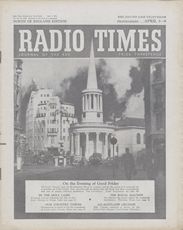Radio 3 is running 70 days of celebrations to mark the anniversary, including "Three Score and Ten," 50 episodes of poets reading from their work and others, a play(!) dramatizing the start of the Programme, "The Present Experiment," as well as rebroadcasts of Humphrey Carpenter's 1996 history, "The Envy of the World." Henry Reed's Hilda Tablet plays are mentioned in episode two of Carpenter's documentary, "Rudely Truncated."
Andy Walmsley is doing a much better job of covering the anniversary over at Random Radio Jottings. For my part, I thought I would bring out this summation of Henry Reed's early contributions to the Third Programme by Douglas Cleverdon, published in the Radio Times on April 1, 1955: "A Henry Reed Season," billing a series of repeat Reed programmes from the first half of the 1950s:

I wish I knew where that quote from Douglas Cleverdon used as the epigraph comes from.A Henry Reed Season
Any young author who aspires to write for radio cannot do better than study the various programmes Henry Reed has written.'
DOUGLAS CLEVERDON, who has produced many of them, introduces the series of revivals beginning in the Third Programme this week
MILLIONS of regular fans look forward to Take It From Here, The Archers, The Goon Show; a very much smaller number of listeners tune in with an even more fervent devotion to any programme written by Henry Reed. For Henry Reed is that rarest of birds, the creative writer who finds in radio his most fruitful medium of expression.
His reputation as a poet was founded on a single volume published nearly ten years ago—A Map of Verona. His only other book is his broadcast version of Moby Dick. His contributions to radio, however, consist of about thirty scripts and seventy talks. Such talks as Towards 'The Cocktail Party' have revealed his critical insight: and the incisive comments he was accustomed to make as a member of 'The Critics' proved his fearlessness in judgment.
But it is principally through the scripts written for the BBC Features Department that he has secured his increasingly appreciative audience. His first work, broadcast from the Midland studios, was a jeu d'esprit on Noises. Then, in January 1947, came his first major work for broadcasting, a radio play based on Herman Melville's Moby Dick, with linking narration in verse a recording of the second production (with Sir Ralph Richardson as Captain Ahab) will be broadcast on April 29. Pytheas (May 1947) was followed in 1949 by The Unblest and The Monument, two dramatic studies in verse of the Italian poet Leopardi, a recording of the 1950 production of The Unblest will be broadcast on April 15.
The Inspiration of Italy
The love of Italy seems to be a permanent element in the English literary tradition; and in Return to Naples (to be re-broadcast on April 5), Henry Reed nostalgically recalled a series of visits to a family in Naples before and after the war. For this autobiographical piece he evolved a simple but elegant variation of the usual radio narration, causing the narrator to address not the listener, but the author himself. A By-Election in the 'Nineties (1951: to be repeated on April 11) was a purely comic documentary, based on contemporary newspaper reports of a Dorset by-election.
Then followed two more programmes on Italian themes: The Streets of Pompeii, which was awarded the Radio Italiana prize for 1953 (a new production will be broadcast on April 22); and The Great Desire I Had, based upon the fancy that towards the end of the sixteenth century Shakespeare visited Italy and fell in with the players of the Commedia dell' Arte.
Then followed the group of satirical comedies, A Very Great Man Indeed, The Private Life of Hilda Tablet, and Emily Butter, with their highly sophisticated wit and exuberant characterisations. As all three have been broadcast fairly recently, none will be repeated during the coming weeks; but many listeners hope that they will form part of the Third Programme's regular repertoire. Henry Reed's latest work, Vincenzo, was broadcast last week as a precursor to the present series of repeats.







